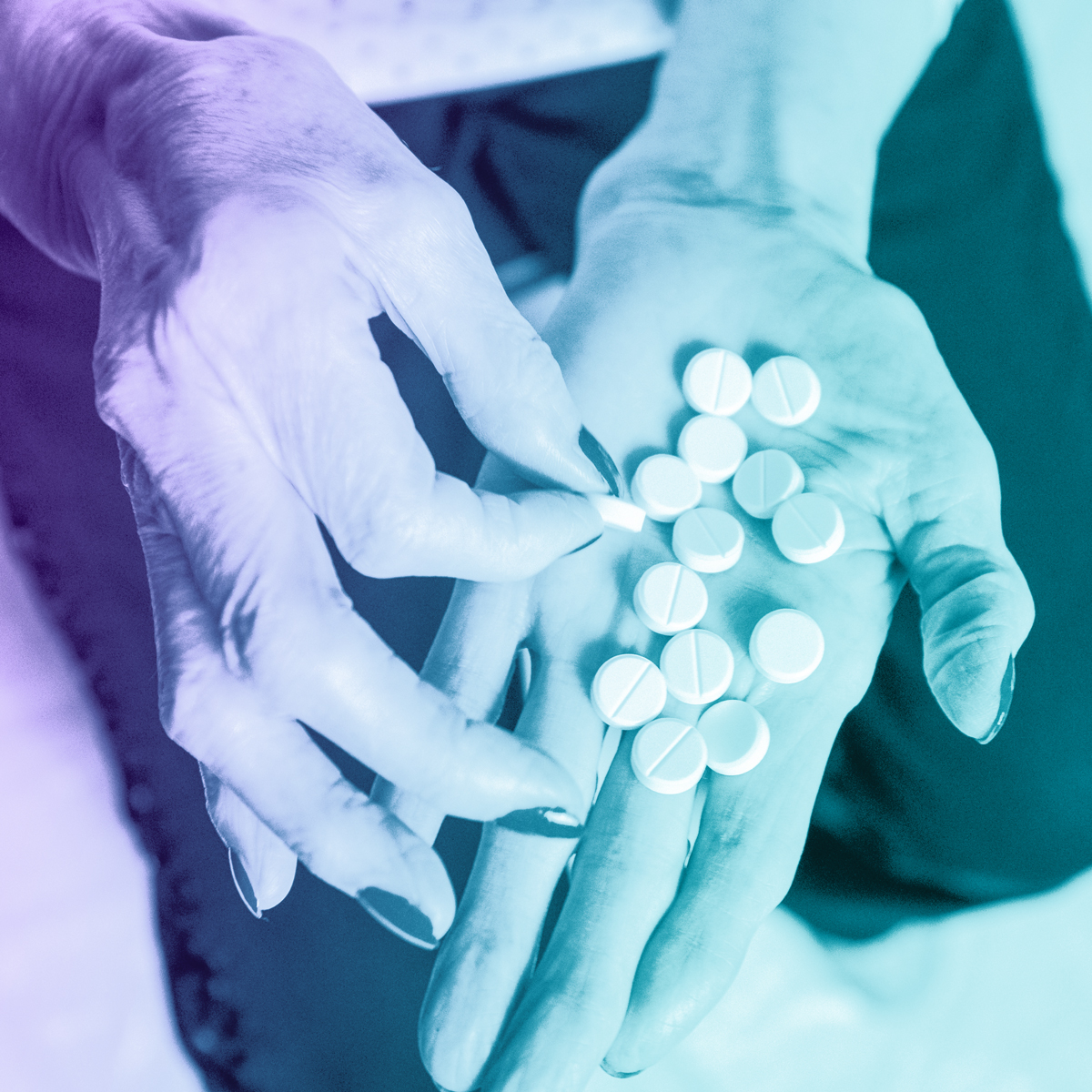Elderly Drug Addiction
Drug and alcohol addiction and abuse in the elderly population is an often overlooked or underestimated issue. It’s a growing one, though, as people are living longer and medical practices including increased access to medication and more prescriptions being doled out are exacerbating the problem. According to the National Institute on Drug Abuse, recent data indicates that around 1 million Americans aged 65 and up have a substance use disorder with the numbers of those seeking treatment on the rise.

Some elderly addicts have been using or abusing drugs and/or alcohol throughout their lives. Some come to addiction later in life for different reasons, often related to aging. Many common events or changes can lead to older adults seeking aid from drugs or alcohol. These include the loss of loved ones, retirement, a decline in health, difficulty sleeping and social changes. A fall, common in the elderly population, might result in a doctor prescribing painkillers that the patient then becomes addicted to. The death of a spouse might lead to the abuse of alcohol to try and cope with loneliness and depression.
It is hard to recognize substance abuse disorders in elderly individuals. Often, medications are prescribed and ingested away from caretakers. People don’t realize that medications prescribed by a specialist for one purpose might interact dangerously with another prescribed by their family practitioner, and problems can develop. Without around-the-clock care, it is hard for loved ones and caregivers to know what exactly might be going on.
This is compounded by the fact that many issues that elderly people are more likely to suffer from – dementia, diabetes, strokes – have symptoms that mimic those of addiction. Confusion, sluggishness, weight loss or gain and changes in energy can all be attributed to both substance abuse disorders and Alzheimer’s. Even changes in personality and moodiness may be simple signs of aging, making it incredibly difficult to determine that the issue might be a substance abuse disorder and that the symptoms aren’t just natural changes in the life cycle.
Although the elderly can become addicted to a wide range of substances just as younger people can, their addictions typically develop in relation to three types of drugs: benzodiazepines, opioids and alcohol.
Benzodiazepines
Aging takes a serious toll on the body and its everyday functioning. As a result, many people seek treatment for the ailments of their changing bodies from their doctors. One of the most common issues that elderly people suffer from is the inability to get quality sleep.
Sleep patterns change as people age and older people may find they are unable to sustain sleep for long periods of time like they used to be able to. Medications used to treat different physical issues such as high blood pressure or cold medicines may keep them from achieving a quality night’s sleep. Health conditions such as dementia, depression and diabetes can contribute to sleeplessness, and lifestyle habits such as moving less due to chronic pain or difficulty getting around may result in not being tired enough to get adequate sleep.
These difficulties can lead to physicians prescribing benzodiazepines, a class of drugs used to treat anxiety, insomnia and sleep disorders. Commonly prescribed medications include Valium (diazepam), Xanax (alprazolam), Klonopin (clonazepam) and Ativan (lorazepam). Although there are differences in how these medications work, they have similar side effects that include dizziness, weakness and drowsiness. You can become addicted to and can overdose on any of them.
Although it is recommended that benzodiazepines only be taken for a few months at a time, many people are continually prescribed them. They may start out on a small dose but eventually need higher doses or even a combination of medicines to achieve the same results. This can result in patients being extremely dependent upon the drugs and they may have severe difficulty in weaning themselves off of them.
Those who are addicted to benzodiazepines also are more likely to develop dementia, adding to the difficulty of separating signs of aging from addiction.
Signs that someone is abusing or addicted to benzodiazepines include slurred speech, seizures, confusion, drowsiness, shakiness and weakness.
Opioids
Just as the elderly may have trouble sleeping and seek out medication to help combat their insomnia, they often suffer from aches and pains that cause them to need relief. Simple tasks like walking, lying down and bathing can become too painful to manage, and the difficulty in simply existing can cause many to go to the doctor looking for some kind of medicinal treatment.
The elderly are also more inclined to suffer from falls that can cause damage including breaks and sprains that may require pain medication. Replacement surgeries for significant body parts such as the knees and hips and other serious surgeries can also lead to the elderly being prescribed high-dose pain medication.
Opioids are highly effective as pain killers but also are extremely addictive. Although there have been changes to the number and frequency of opioid prescriptions being given over the last decade, they are still the most commonly prescribed form of pain medication and addiction continues to be an issue. This is especially true of those most vulnerable to pain and in need of relief including the elderly. When opioids have been the only thing capable of giving you relief enough to feel able to function, it can be very difficult to give them up without professional guidance.
Commonly prescribed opioids include Vicodin (hydrocodone), OxyContin and Percocet (oxycodone), Opana (oxymorphone) and Kadian and Avinza (morphine). All of these are addictive and all can be overdosed on.
Signs that someone may be abusing or addicted to opioids include drowsiness, weight loss, changes in sleep habits and lack of hygiene.
Alcohol
Some elderly people may suffer the same symptoms as those who seek professional medical help but instead choose to self-medicate through alcohol. There are many reasons for this. It is easily accessible, legal and a kind of treatment that elderly individuals may feel more comfortable using compared to prescription medications that can only be obtained through doctor’s visits.
For many older people, visiting a doctor’s office can be challenging for a variety of reasons: difficulty in scheduling and remembering appointments, issues with securing transportation to and from the doctor’s office and fear of finding out something serious might be wrong are just a few of these. Alcohol, on the other hand, can be obtained relatively easily and inexpensively, and it is likely they have had experience with using it throughout their lifetime.
Unfortunately, the body’s ability to metabolize drugs and alcohol decreases as people age. This means that someone who used to be able to have a few drinks in the evening and not experience difficulties from it may feel woozy or lightheaded after drinking the same amount later in life. This can result in an especially dangerous relationship to alcohol for the elderly as alcohol destabilizes a person and they are already at higher risk for dangerous falls and car accidents.
Alcohol can also make health conditions typical to the elderly worse. Diabetes, osteoporosis, ulcers, high blood pressure and memory loss can all be aggravated through the abuse of alcohol.
Signs of alcohol abuse or addiction include slurred speech, impaired motor skills and coordination, issues with memory, difficulty concentrating and lowered inhibitions.
Additionally, the combination of any of these three types of drugs can be extremely dangerous, leading to overdose and even death in some cases.
Although it can be difficult to recognize and diagnose substance abuse disorders in the elderly population, it is important to be aware of potential issues when caring for an older individual. There are many types of treatments available now appropriate for adults of all ages to help meet those suffering with a substance abuse disorder wherever they may be in their addiction. Whether it is a grandmother with alcohol issues or a great-uncle addicted to painkillers, recovery is possible with the right tools and support. If you or a loved one are struggling with addiction, contact Clean Recovery Centers today to get the guidance needed to achieve sustainable recovery.
Sources:
- https://www.drugabuse.gov/drug-topics/older-adults
- https://www.drugabuse.gov/publications/substance-use-in-older-adults-drugfacts
- https://www.rxlist.com/benzodiazepines/drug-class.htm
- https://www.nia.nih.gov/health/facts-about-aging-and-alcohol


